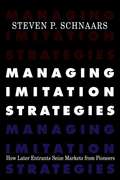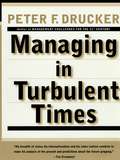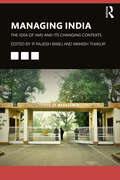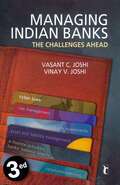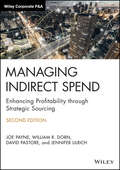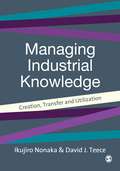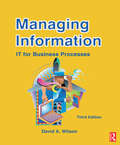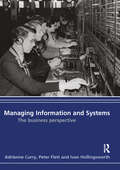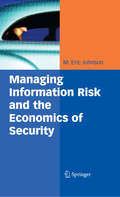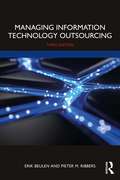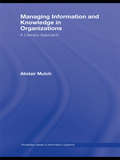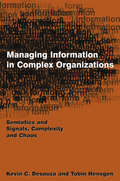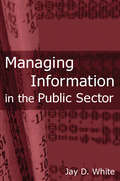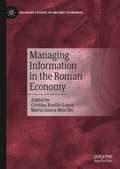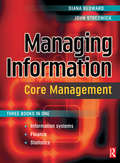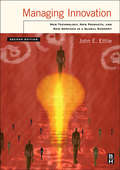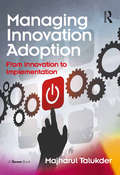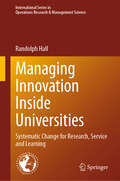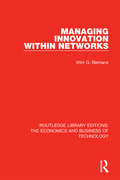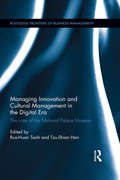- Table View
- List View
Managing Imitation Strategies
by Steven P. SchnaarsPioneers -- those innovative "first movers" who enter markets before competitors - are often deified as engines of economic growth while imitators are generally scorned as copycats and shameful followers. But who most often wins? Drawing on seven years of research, Steven Schnaars documents that, in sharp contrast to conventional beliefs, imitators commonly surpass pioneers as market leaders and attain the greatest financial rewards. How do they do it? In this ground-breaking book -- the first to formulate imitation strategies for managers -- Schnaars systematically examines 28 detailed case histories, from light beer to commercial jet liners, in which imitators such as Anheuser-Busch and Boeing prevailed over pioneers. He describes the marketing wars, court battles, and even personal vendettas that often resulted, and shows that imitators have several clear advantages. Pioneers are forced to spend heavily on both product and market development. They also risk making costly mistakes. Pioneers often aid in their own destruction, thrown into confusion by rapid growth, internal bickering, and the neverending search for expansion capital. Moreover, imitators do not have to risk expensive start-up costs or pursuing a market that does not exist, enabling them to quickly outmaneuver pioneers once the market is finally shaped. By patiently waiting on the sidelines while the innovator makes the mistakes, imitatorscan also usurp benefits from the test of time -- major defects in the product having been removed by the pioneer at an earlier stage in the game. Schnaars discusses the three basic strategies that successful imitators such as Microsoft, American Express, and Pepsi have used to dominate markets pioneered by others. First, some imitators sell lower-priced, generic versions of the pioneer's product once it becomes popular, as Bic did with ballpoint pens. Second, some firms imitate and improve upon the pioneer's product; for example, WordPerfect in the case of word processing software. Third, building on their capital, distribution, and marketing advantages that smaller pioneers cannot hope to match, imitators use the most prevalent strategy of all -- bullying their way into a pioneer's market on sheer power. In several cases a one-two-punch, or combination of strategies, is often utilized by the imitator to remove any doubt regarding their dominance in the market and in the eyes of the public. Schnaars concludes that the benefits of pioneering have been oversold, and that imitation compels recognition as a legitimate marketing strategy. It should be as much a part of a company's strategic arsenal as strategies for innovation.
Managing In Turbulent Times
by Peter F. DruckerThis book, the author explains, "is concerned with action rather than understanding, with decisions rather than analysis." It deals with the strategies needed to transform rapid changes into opportunities, to turn the threat of change into productive and profitable action that contributes positively to our society, the economy, and the individual.
Managing India: The Idea of IIMs and its Changing Contexts
by R Rajesh Babu and Manish ThakurThis book explores the history and metamorphosis of the Indian Institutes of Management (IIMs), the premier business and management schools in India, and their significance within the changing landscape of higher education, nation-building and socio-economic development in the country. Over the past decades, IIMs, as institutions, have recalibrated their goals and priorities to address contemporary challenges in a globalised world, changing aspirations of a rapidly growing population and the changing idea of India. This book examines different facets of the challenges the institutes have faced in the aftermath of independence. These include the challenges of effective institutional governance; ensuring equity and access; democratisation; raising the bar for teaching and research; addressing national imparities and global benchmarking; accreditation and ranking; and academia, industry, and employability. Drawing upon the interplay of the experiential and analytical, the contributors to the volume also engage with the Indian knowledge system and the contested terrain of global theory and research. This volume will be of interest to scholars, researchers and practitioners of education, management studies, academic administration, and policymaking in the field of higher education.
Managing Indian Banks: The Challenges Ahead (Response Books)
by Vasant C Joshi Vinay V JoshiThis revised and updated edition of Managing Indian Banks: The Challenges Ahead equips the senior and middle management of banks/financial institutions in dealing with extremely complex issues that have emerged in the post sub prime lending crisis. Highlighting the way organisations can develop systems in a proactive manner to deal with the myriad problems facing them, this book focuses on - major technological changes in the banking sector; - risk management; - integrating click and brick banking services; and - problems and solutions with regard to banks’ balance sheet, corporate planning, corporate personnel and e-banking. The authors argue that overcoming these challenges is the key to acquiring competitive advantages and developing a sound market for financial services. This book would be helpful for the students of banking, financial management and bank management.
Managing Indirect Spend: Enhancing Profitability Through Strategic Sourcing (Wiley Corporate F&A #557)
by Joe Payne William R. DornUnique guidance for cutting costs regardless of economic conditions—without reducing headcounts Successfully reduce costs in the area of indirect spend and watch your bottom line grow. Managing Indirect Spend provides you with the knowledge and tools necessary to get it done with an overview of: the challenges faced when sourcing indirect spend categories; strategic sourcing process; tools that can help drive savings, and examples based on real world experience. This how-to guide clearly covers specific sourcing engagements and provides the details needed to source effectively. Includes sections covering the process, the tools, real-world examples, guidance through specific sourcing engagements and the information needed to source effectively Presents guidance for achieving the object of strategic sourcing: cost reduction Shows how effectively managing indirect costs can provide a huge impact on bottom line growth Covers all areas of Market Intelligence (MI) With tools, real world examples, and workable guidance, Managing Indirect Spend provides insider guidance for big bottom-line growth through effective management of indirect costs.
Managing Indirect Spend: Enhancing Profitability through Strategic Sourcing (Wiley Corporate F&A #557)
by Joe Payne William R. Dorn David Pastore Jennifer UlrichManaging corporate spend is far more complex than conducting RFPs. Learn how the most efficient and effective procurement departments operate, control costs, enforce compliance, and manage indirect spend. Managing Indirect Spend provides executives and procurement professionals with the knowledge and tools necessary to successfully reduce costs with a strong focus on the often-overlooked area of indirect spend. It also offers great value to those procurement and purchasing professionals aspiring to be leaders in the profession, regardless of the spend they manage. It includes an overview of the challenges faced when sourcing indirect spend categories, a detailed dive into the strategic sourcing process, tools that can help drive savings, technologies that drive efficiencies and compliance, and examples of success based on real-world experience. It is a how-to guide that clearly covers sourcing engagements of any complexity and provides the details needed to source effectively. The book is structured into sections covering the sourcing and procurement process, the tools and technologies, examples from the field, walkthroughs of specific sourcing engagements, guidance on building an effective sourcing team, and the information needed to become a best-in-class sourcing organization. Since the initial publication of this book, the procurement profession and the discipline of Strategic Sourcing have matured. Markets have changed, processes developed, trends have come and gone, and technology has experienced leaps and bounds, posing new and interesting challenges for procurement professionals. In addition to covering tried-and-true practices for strategic sourcing, this Second Edition discusses how strategic sourcing has evolved and provides an update on the techniques, tools, and resources available to purchasing groups. This book: Includes updated coverage of everything you need to know to source more effectively Covers the latest trends in procurement and sourcing, including technology, process improvements and organizational design Presents guidance for reducing costs through strategic sourcing, no matter what the economic climate or level of maturity of the existing procurement organization Shows how effectively managing indirect costs can provide a huge impact on bott m line growth Introduces Market Intelligence (MI), including techniques, tools, and resources available to procurement and supply chain management groups With tools, real-world examples, and practical strategies, Managing Indirect Spend provides insider guidance for big bottom-line growth through effective management of indirect costs.
Managing Industrial Knowledge: Creation, Transfer and Utilization (Strategic Management And Planning Ser.)
by Ikujiro Nonaka David J TeeceManaging Industrial Knowledge illuminates the complex processes at work in the creation and successful transfer of corporate knowledge. It is now generally recognized that the competitive advantages of firms depends on their ability to build, utilize and protect knowledge assets. In this volume many of the foremost international authors and pioneers of the study of knowledge in firms present their latest work and insights into organizational knowledge and innovation. In a world where markets, products, technologies, competitors, regulations, and even societies change rapidly, continuous innovation and the knowledge that produces innovation have become key. The chapters in this keynote volume shed new light on the contextual factors in knowledge creation, the links between knowledge and innovation in all aspects of business life and the processes by which these may be fostered or lost in organizations.
Managing Industrial Services: From Basics to the Emergence of Smart and Remote Services (Management for Professionals)
by Thomas Friedli Philipp Osterrieder Moritz ClassenThe increasing importance of industrial services and rapid digitalization towards smart and remote services pose opportunities as well as challenges to the manufacturing sector. This book provides a holistic understanding of industrial service management and guides companies into building capabilities and management practices for smart and remote services. By combining insights from research and practice, it offers a unique perspective on the core and enabling activities of manufacturing companies for growth in the service business.In essence, the first part covers action-based research findings regarding service strategy, organizational design, service innovation, service sales, services operations, and customer relationship management together with insights into value networks. The second part introduces outstanding practices from leading manufacturing companies in industrial and smart services. The book concludes with a summary of key messages and recommendations to navigate the landscape of industrial and smart service management successfully.
Managing Information
by David A Wilson'Managing Information' describes how successful organizations make best use of information and knowledge - the key resources in business. It explains why information technology is essential for the management of business processes, and should be central to any business strategy. This updated edition provides a compelling rationale for organizations to use appropriate systems, and for individuals to acquire the skills to manage and use the systems. It describes how computer systems continue to evolve to meet business needs, and provides examples and exercises to help readers develop their skills. There is a new emphasis on the Internet - how to use it to keep up to date with the latest business issues, and how teams can communicate and collaborate with intranets.All of the most common sub-systems are described and explained, including Enterprise Resource Planning (ERP), Business-to-Business (B2B), Business-to-Consumer (B2C), Supply Chain Management (SCM), Customer Relationship Management (CRM) and Enterprise Application Integration (EAI). The latest developments are described, including services available through the Internet from Application Service Providers (ASP), collaborative commerce and Business Process Management (BPM).There are introductory and more advanced computer exercises to consolidate learning and demonstrate how to acquire, store, organize and present information, using Word, Excel, PowerPoint and Explorer.
Managing Information & Systems: The Business Perspective
by Adrienne Curry Peter Flett Ivan HollingsworthFocusing on the integrated understanding of the role of systems within the business, organizationally and strategically, this book demonstrates theory by including extensive business examples, and by ending each chapter with international case studies. Topics covered include: the nature of organizations management roles and functions information as a resource systems approaches different information systems and what they can achieve structural and cultural fit and information systems change management and information systems strategic business and information systems management. Combining readability with theoretical concepts, this book is suitable for both advanced undergraduate and MBA/Masters students.
Managing Information Risk and the Economics of Security
by M. Eric JohnsonThe lifeblood of the global economy, information has become a source of growing risk as more firms maintain information online. With risks now fueled by sophisticated, organized, malicious groups, information security requires not only technology, but a clear understanding of potential risks, decision-making behaviors, and metrics for evaluating business and policy options. Managing Information Risk and the Economics of Security, an edited volume contributed by well-established researchers in the field worldwide, presents the latest research on economics driving both the risks and the solutions. Covering the implications of policy within firms and across countries, this volume provides managers and policy makers with new thinking on how to manage risk. Managing Information Risk and the Economics of Security is designed for managers, policy makers, and researchers focusing on economics of information security, as well as for advanced-level students in computer science, business management and economics.
Managing Information Risk: A Director's Guide
by Stewart MitchellThis pocket guide addresses the scope of risks involved in a modern IT system, and outlines strategies for working through the process of putting risk management at the heart of your corporate culture. This pocket guide should provide decision makers with a solid overview of the factors they need to consider and a framework for implementing a regime that suits their needs. It provides a checklist of steps that companies need to take to safeguard against various threats, highlights potential vulnerabilities and lists methodologies for mitigating against the risks. This pocket guide draws on previous works by senior security advisory bodies - in particular the US National Institute of Standards and Technology, which has produced numerous landmark 'Special Publications' on the subject, and various UK government guidelines drawn up in the wake of high- profile data breaches. UK governmental and industry white papers were also consulted during research, including interviews with security analysts and board-level risk management practitioners.
Managing Information Technology Outsourcing
by Erik Beulen Pieter M. RibbersFor decades, outsourcing has been a major international phenomenon in business. The areas of Technology, Information Technology and Management represent a unique case for outsourcing both in terms of benefits and potential interorganisational problems. This fully updated text has been brought up to date with this new landscape, including discussion of Robotic Process Automation, Internet of Things, cloud computing, low code and DevOps and agile. With a range of new global case studies in manufacturing, logistics, chemical industry and cloud services, this textbook offers a strong grounding in real-world industrial experience that effectively combines theory with practice. Uniquely, this book focuses on both sides of the outsourcing relationship, providing a balanced exploration of the ways in which these partnerships can be managed successfully. Accessible and cutting-edge, the third edition of Managing Information Technology Outsourcing provides an in-depth, practical perspective on this important and far-reaching challenge in information technology management. It is an ideal text for students, academics and practitioners alike.
Managing Information and Knowledge in Organizations: A Literacy Approach (Routledge Series In Information Systems Ser.)
by Alistair MutchKnowledge is increasingly regarded as central, both to the successful functioning of organizations and to their strategic direction. Managing Information and Knowledge in Organizations explores the nature and place of knowledge in contemporary organizations, paying particular attention to the management of information and data and to the crucial en
Managing Information and Statistics
by Frances Bee Roland BeeIn an age where organisations handle significant volumes of data on a daily basis, it is vital that effective information management systems are put in place to manage them and use them to their full potential. Managing Information and Statistics provides the information needed for a sound understanding of the concepts that underpin this key area that is now a feature of every aspect of organisational life. The first part deals with information systems generally, whilst the second looks at how numerical data can be used to develop strategy. Topics addressed include how to utilise information systems for planning and organisation, and storing data; how to design, develop and implement an information systems; data security and human resources information system; how to exploit statistics to sample, forecast and make informed decisions.Fully revised and restructured to cater for CIPD students taking the Managing Information for Competitive Advantage module, as part of the Leadership and Management standards, Managing Information and Statistics is also essential reading for HR and business practitioners looking to further their professional development and manage effectively, as well as students studying information management as part of wider HR and business degrees. This fully revised edition includes case studies, examples, chapter objectives, exercises, chapter conclusions and further reading suggestions to aid student learning, as well as new chapters on Knowledge Management and the E-organisation. With a strategic approach and accessible style, this is your step-by-step guide to developing, managing and utilising information and statistics in a business context.
Managing Information in Complex Organizations: Semiotics and Signals, Complexity and Chaos
by Kevin C. Desouza Tobin HensgenThis seminal work presents an effective design for processing information through five stages from data to actionable knowledge in order to influence behavior within organizations. The authors incorporate such concepts as evolution, semiotics, entropy, complexity, emergence, crisis, and chaos theory in an intriguing alternative to crisis management that can be applied to any organization. Their model shows how to evaluate and share information to enable the organization to avoid disaster rather than simply respond to it. Additionally, the text presents the first attempt at a multi-disciplinary view of information processing in organizations by tying associated disciplines to their respective impacts on the information process. Illustrations used in the text include an overlay that demonstrates how the non-use of information between agencies contributed to the 9/11 disaster, and an appendix addresses Organizing for Cyberterrorism.
Managing Information in the Public Sector
by Jay D WhiteThis first-of-its-kind survey covers both the basics of information technology and the managerial and political issues surrounding the use of these technologies. Unlike other works on information systems, this book is written specifically for the public sector and addresses unique public sector issues and concerns. The technical basics are explained in clear English with as little technical jargon as possible so that readers can move on to informed analysis of the public policy issues surrounding government's use of MIS. This practical tool includes end of chapter summaries with bridges to upcoming chapters, numerous boxed exhibits, thorough end-of-chapter notes and a bibliography for further reading.
Managing Information in the Roman Economy (Palgrave Studies in Ancient Economies)
by Marta García Morcillo Cristina Rosillo-LópezThis volume studies information as an economic resource in the Roman World. Information asymmetry is a distinguishing phenomenon of any human relationship. From an economic perspective, private or hidden information, opposed to publicly observable information, generates advantages and inequalities; at the same time, it is a source of profit, legal and illegal, and of transaction costs. The contributions that make up the present book aim to deepen our understanding of the economy of Ancient Rome by identifying and analysing formal and informal systems of knowledge and institutions that contributed to control, manage, restrict and enhance information. The chapters scrutinize the impact of information asymmetries on specific economic sectors, such as the labour market and the market of real estate, as well as the world of professional associations and trading networks. It further discusses structures and institutions that facilitated and regulated economic information in the public and the private spheres, such as market places, auctions, financial mechanisms and instruments, state treasures and archives. Managing Asymmetric Information in the Roman Economy invites the reader to evaluate economic activities within a larger collective mental, social, and political framework, and aims ultimately to test the applicability of tools and ideas from theoretical frameworks such as the Economics of Information to ancient and comparative historical research.
Managing Information: Core Management
by John Stredwick Diana BedwardThe authors focus on the following topics:Information Systems*Contribution of IS/IT to organisations*Systems concepts and attributes*Planning, reviewing and controlling with IS*Serving the end user - spreadsheets, databases, e-mail and DTP*Software application for HR and other areas*Legislation and SecurityFinance*Sources and application of funds*Accounting documentation - cash statements, profit and loss accounts, balance sheets*Interpretation of accounts - management ratios*Costing and budgetingStatistics*Sources and uses of statistics*Presentation of statistics*Interpretation - measures of average, measures of distribution, correlation, time series, index numbers, significance tests*Use of current software for computation of statistics
Managing Innovation
by John EttlieManaging Innovation: New Technology, New Products, and New Services in a Global Economy, 2nd Edition is devoted to providing a better understanding and better management of all of the causes and consequences of change that have technological implications in and around our global organizations. This text is a unique, original contribution and represents a significant alternative to the collection of chapters written by others. The second edition has new cases with a few classics from the first edition that have been retained in response to reader feedback. The key subjects that are included have been significantly updated and treated in greater depth. The number of chapters has been reduced from 12 to 10 so it is easy to adapt to almost any course or training on the subject in any discipline or to any audience. This exceptionally informative book provides a broad perspective on how technological change can be effectively managed in modern organizations. The text explains the conceptual frameworks supported by new and original case studies for start-up companies like Askmen.com, the complex challenges of managing international technology-based companies like NexPress (a joint venture of Kodak and Heidelberg) in the digital printing industry, and corporate sustainability using innovative new product technologies illustrated by the case of Evinrude’s launch of the E-tec® outboard motor.John E. Ettlie's three decades in the field of innovation as an instructor and researcher bring an exceptional perspective to this subject. His text is unique in its discussion of how technology has transformed the service sector. Few books on technology make the distinction between new offerings in manufacturing and the service sector which is emphasized in this text.
Managing Innovation Adoption: From Innovation to Implementation
by Majharul TalukderWhen Innovation is considered one of the key drivers of corporate success, why do organisations struggle to implement it? Research suggests that innovations fail due to a lack of acceptance by employees; therefore an understanding of potential adopters and the factors influencing their decisions is essential. Despite much research on adoption of innovation by an organization, very little is known about its acceptance by individuals within it. Managing Innovation Adoption is about managing technological innovation implementation at work in an effective way by presenting a new theoretical framework. Based on the theory of reasoned action (TRA), the technology acceptance model (TAM) and other conceptual frameworks, Dr Talukder’s enhanced model combines factors from existing and original models to create a coherent new model. The data collected proves that it can be used to assist a broader understanding of how people in an organization adopt and use innovations. As well as contributing to academic knowledge, the author’s discoveries have practical implications for organizations, managers, administrators and employees.
Managing Innovation Inside Universities: Systematic Change for Research, Service and Learning (International Series in Operations Research & Management Science #357)
by Randolph HallThis book offers guidance on capturing the creative forces of the faculty, staff and students at universities. Given their unique and central role in America and the world, it examines how university research, learning and service can be integrated to address the needs of society as it is both enabled and changed by technology. In turn, the book assesses the challenges and opportunities for universities to be more successful and impactful through innovation, viewing universities as integrated systems. It demonstrates how change can occur both within the “knowledge economy” and because of innovations within it. In doing so, the book provides insights into how universities can prosper and lead in a world that is constantly changed by the innovations that universities and industry jointly create. The book serves as a guide for higher education policymakers, funders, donors, board members, stakeholders and leaders (chairs, deans, provosts, presidents) through its systematic vision for university innovation and service to society. It will also benefit researchers studying innovation in organizations, illustrating how systematic approaches arising from management science and operations research can be used toward positive change. Lastly, strategic partners in industry, government and foundations seeking opportunities for partnerships and collaboration with universities will also find it useful.
Managing Innovation Streams in Ambidextrous Organizations
by Michael L. Tushman Charles A. O'ReillyThis chapter looks at how firms that actively manage streams of innovation can take advantage of fundamentally new markets for existing technology while also creating new markets and competitive rules.
Managing Innovation Within Networks (Routledge Library Editions: The Economics and Business of Technology #7)
by Wim BiemansOriginally published in 1992 and now with an updated Preface this book analyses the development of innovations using a network perspective. The book offers practical guidelines with direct managerial relevance based on evidence collected from twenty-two case studies. First introducing theories of product development, adoption and diffusion, it then places them in the context of industrial networks, investigating such topics as user-involvement, interaction and market strategies. The book is essential reading for students of marketing, technology and strategy.
Managing Innovation and Cultural Management in the Digital Era: The case of the National Palace Museum (Routledge Frontiers of Business Management)
by Rua-Huan Tsaih Tzu-Shian HanThe world-class National Palace Museum (NPM) in Taiwan possesses a repository of the largest collection of Chinese cultural treasures of outstanding quality. Through implementing a two-organizational restructuring, and shifting its operational focus from being object-oriented to public-centered, it aims to capture the attention of people and promote awareness of the culture and traditions of China. In this vein, the NPM combines its expertise in museum service with the possibilities afforded by Information Technology (IT). This book analyses the research results of a team sponsored by the National Science Council in Taiwan to observe the development processes and accomplishments, and to conduct scientific researches covering not only the technology and management disciplines, but also the humanities and social science disciplines. The development process of new digital content and IT-enabled services of NPM would be a useful benchmark for museums, cultural and creative organizations and traditional organizations in Taiwan and around the world.
